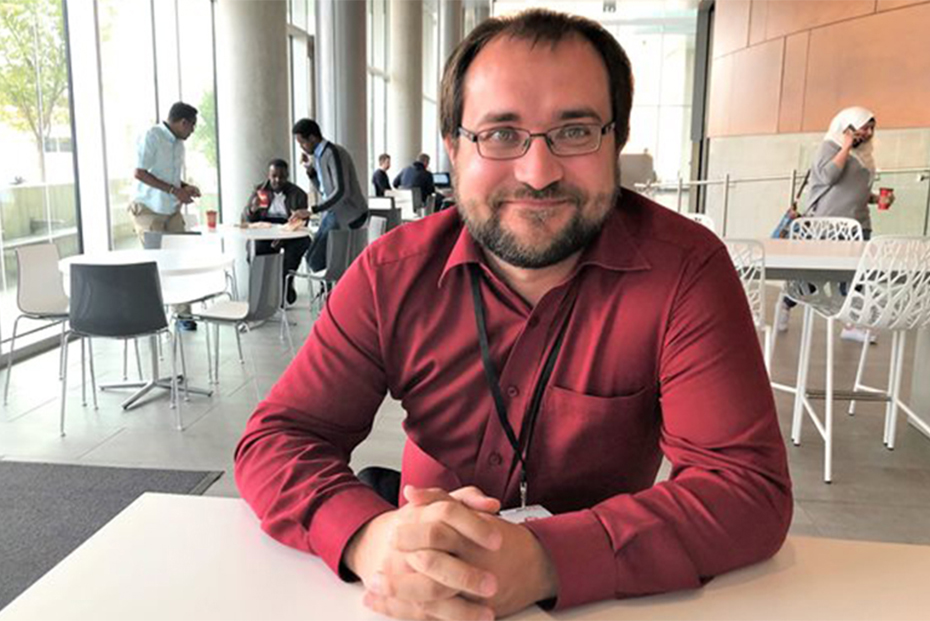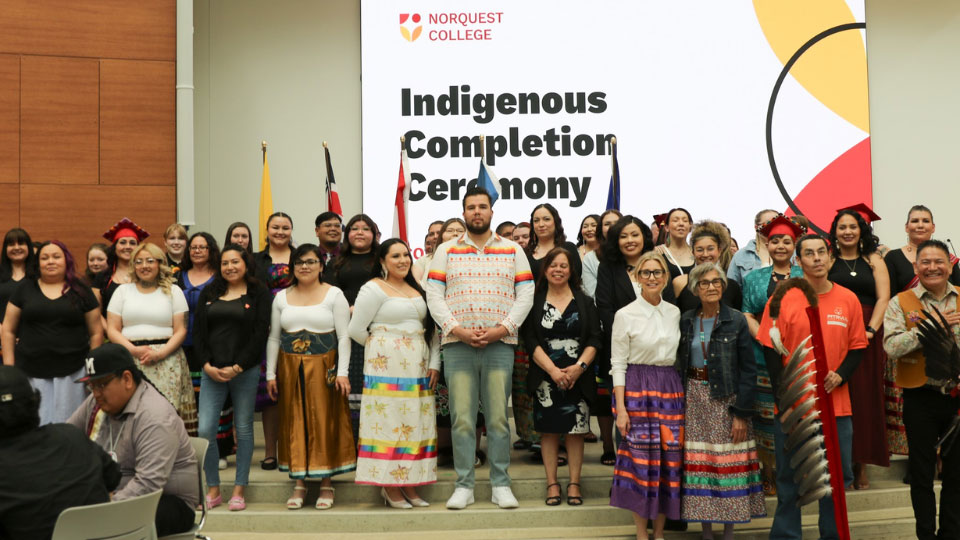Settle in and make yourself at home
September 15, 2019

This is a polarizing time in the world we live in. Dangerous and irresponsible rhetoric and disappointing sentiment towards newcomers is getting louder and louder. At NorQuest, it is our goal to #InvestInInclusion and provide contrasting information that shows the value of newcomers and reminds us all that our nation was built on welcoming people from every corner of the world.
Romanian-born and Canadian-raised NorQuest College program developer Alexandru Caldararu not only has one of the more exotic names Edmontonians may hear, he might just also be one of this city’s most worldly residents. This despite barely being outside of Canada since birth.
“I tell people that I have been hit hard by the travel bug. And I haven’t even been able to scratch that itch yet. But working at NorQuest is the next best thing because the whole world comes through our doors.”
It’s the truth. Student diversity at NorQuest features 62 per cent of the population born outside of Canada. Overall, 77 languages are spoken on campus, representing 131 countries of origin, and you can go from Columbia to the Horn of Africa to Siberia and back to Edmonton in about as much time as it takes to say hola, selami, or privet.
Caldararu’s professional history and current role at NorQuest has put him right on the greeting line for many of our country’s newcomers. He’s a former settlement worker with Edmonton Immigrant Services Association, and after a few years teaching at NorQuest in the Community Support Worker program, he is now the proud parent of one of the college’s newest program offerings. His baby? The Settlement Studies diploma program, a first-of-its-kind in western Canada that will hold its inaugural classes this September.
“This is a passionate project of ours,” says Caldararu, who worked closely with colleague Angelica Quesada to meet with community members, immigrant services agencies, and internal stakeholders to develop a program that can have wide-reaching benefits for both graduates and immigrants to Canada.
“The best way to describe the program is to put it in an inter-disciplinary human resource context. Although it combines elements of social work, immigration consultation, and community development, the outcome is something greater than the sum of its parts.”
Caldararu is quick to point out that he isn’t reinventing the wheel here. There are practitioners out there serving newcomers and helping people adjust to their new surroundings. However, he notes, after years of being in the field of immigration services and education, in one facet or another, he recognizes that there are areas of specialization that were lacking.
“If you look at some of the literature between 2000 and 2017, particularly when the Syrian refugee wave hit, there were a lot of gaps identified by researchers who analyzed the settlement sector, researchers who indicated that more work needed to be done to equip settlement workers with the skills needed to engage in trauma-centred care, intercultural conflict management, or other strength-based practices.
“When people transition to settlement work now,” he continues, “they often have some combination of lived experience, post-secondary education in an un-related field or passion. So, they kind of fall into this line of work and they learn as they go. But that also means that mistakes that you made during that learn-as-you-go process could have been prevented with some specific training.”
And when it comes to working with newcomers to Canada, there really is little room for mistakes. Newcomer or immigration agencies are often the first contact many have with the broader public after arriving in Canada. Presenting clients with an air of confidence and compassion for what they have gone through, and what lies ahead, is important to helping them develop their own trust and confidence. These are abilities that will help anyone who is arriving in a new country.
“A settlement worker can work in an inter-cultural space and meet people at any given point in their lives,” says Caldararu. “Simply put: they work with people on their journey to integrate into Canadian society.”
That journey is a very personal one for Caldararu. His parents arrived in Edmonton from Romania in the 1980s when he was very young.
“I distinctly remember growing up and feeling disconnected from my ancestral homeland, and the culture of where I now lived. My parents did speak English but it wasn’t the primary language in the house. They were trying to pass on their traditions but at the same time I had a real collision with what my friends were experiencing, which was much different.
“I remember a feeling of not belonging to either and I think that is a common sentiment with younger newcomers: they feel the pressure to conform in a world of competing cultural values.”
Caldararu’s parents indeed fit the stereotype of a lot of newcomers. They worked hard, often multiple jobs at a time, and did what they could to provide for their children. However, they never really had the opportunity to connect with resources that could have helped ease their transition to Canadian society.
“I can’t imagine that what they got when they arrived in Canada is necessarily what they envisioned when they left Romania. They really struggled at times with the language, with the culture, and the fact they had to work three or four jobs to makes ends meet.
“So I have never forgotten that sacrifice my parents had to make. My way to honour that is to use whatever capacities I have to try and make it so people don’t have to sacrifice like that when they come to Canada.”
Caldararu points out that these type of services for newcomers in no way take away from Canadians as a whole. In fact, creating healthy, happy, and confident newcomers adds to the value of life for everyone.
Immigrants are the backbone of the Canadian labour market and economy. If we want to continue attracting the best and brightest the world has to offer to our shores, then we have to recognize that it is not solely up to newcomers to ‘fit in.’
“We have a responsibility to adjust the way we relate to one another to create communities that are welcoming and inclusive for others who may be very different from us. If we are able to do that, than I believe we are setting ourselves up for a more prosperous and equitable future.”


